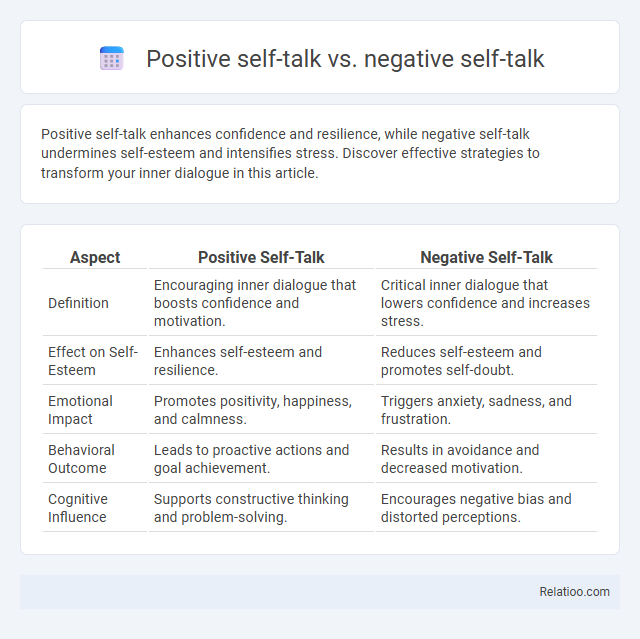Positive self-talk enhances confidence and resilience, while negative self-talk undermines self-esteem and intensifies stress. Discover effective strategies to transform your inner dialogue in this article.
Table of Comparison
| Aspect | Positive Self-Talk | Negative Self-Talk |
|---|---|---|
| Definition | Encouraging inner dialogue that boosts confidence and motivation. | Critical inner dialogue that lowers confidence and increases stress. |
| Effect on Self-Esteem | Enhances self-esteem and resilience. | Reduces self-esteem and promotes self-doubt. |
| Emotional Impact | Promotes positivity, happiness, and calmness. | Triggers anxiety, sadness, and frustration. |
| Behavioral Outcome | Leads to proactive actions and goal achievement. | Results in avoidance and decreased motivation. |
| Cognitive Influence | Supports constructive thinking and problem-solving. | Encourages negative bias and distorted perceptions. |
Understanding Self-Talk: Definition and Types
Self-talk refers to the internal dialogue that influences your thoughts, emotions, and behavior, functioning as a powerful psychological tool. Positive self-talk enhances motivation, resilience, and self-esteem by promoting encouraging and affirming messages, while negative self-talk fosters self-doubt, anxiety, and decreased performance through critical and pessimistic statements. Understanding these types allows you to harness self-talk effectively, transforming mental habits to improve overall well-being and personal success.
The Science Behind Self-Talk and Mindset
Self-talk, the internal dialogue individuals engage in, plays a pivotal role in shaping mindset and emotional well-being. Positive self-talk enhances neural pathways related to motivation and resilience, activating brain regions such as the prefrontal cortex, which supports cognitive control and stress regulation. Conversely, negative self-talk triggers the amygdala, increasing anxiety and impairing performance, thereby reinforcing limiting beliefs and hindering psychological growth.
Characteristics of Positive Self-Talk
Positive self-talk involves affirming and constructive internal dialogue that boosts confidence, motivation, and resilience, cultivating a growth mindset and emotional well-being. Negative self-talk is characterized by critical, pessimistic thoughts that undermine your self-esteem and increase stress, often leading to a fixed mindset and decreased performance. Understanding the distinction in self-talk enables you to harness positive self-talk's power to improve mental health and achieve personal goals.
Characteristics of Negative Self-Talk
Negative self-talk is characterized by critical, pessimistic, and self-defeating thoughts that undermine confidence and increase stress. Unlike positive self-talk, which promotes motivation and resilience, negative self-talk often involves catastrophizing, self-doubt, and unrealistic expectations. Your awareness of these harmful patterns can help you challenge and replace them with constructive internal dialogue.
Impact of Positive Self-Talk on Mental Health
Positive self-talk significantly enhances mental health by promoting resilience, reducing stress, and boosting self-esteem through affirming and constructive inner dialogue. Negative self-talk, characterized by self-criticism and doubt, contributes to anxiety, depression, and diminished confidence, undermining overall well-being. Self-talk, the internal conversation individuals have with themselves, serves as a powerful cognitive tool influencing emotions and behavior, with positive patterns fostering psychological strength and negative patterns leading to mental health challenges.
Consequences of Negative Self-Talk
Negative self-talk significantly undermines mental health by increasing stress, anxiety, and depression symptoms, leading to reduced motivation and poor decision-making. Positive self-talk, in contrast, promotes resilience, confidence, and better coping strategies, enhancing overall well-being and performance. Understanding the impact of self-talk is crucial for developing healthier cognitive patterns that prevent the detrimental consequences associated with negative internal dialogues.
Common Examples of Positive vs Negative Self-Talk
Positive self-talk includes affirmations like "You can handle this challenge" and "Your efforts lead to success," promoting confidence and resilience. Negative self-talk often involves phrases such as "I always fail" or "I'm not good enough," which can undermine motivation and increase stress. Understanding the difference in common examples helps you foster a mindset that encourages growth and reduces self-doubt.
Strategies to Shift from Negative to Positive Self-Talk
Shifting from negative to positive self-talk involves consistently recognizing and challenging limiting beliefs while replacing them with empowering affirmations that promote confidence and resilience. Techniques such as cognitive restructuring, mindfulness meditation, and journaling support awareness of harmful thought patterns and foster a constructive internal dialogue. Research indicates that implementing these strategies improves mental health outcomes and enhances overall emotional well-being.
Benefits of Practicing Positive Self-Talk Daily
Positive self-talk enhances your mental well-being by fostering increased confidence, reducing stress, and promoting resilience against challenges. Negative self-talk, in contrast, can undermine your motivation and contribute to anxiety or depression, highlighting the critical value of maintaining constructive inner dialogue. Practicing positive self-talk daily cultivates a growth mindset, supports emotional regulation, and improves overall performance in personal and professional settings.
Building Long-Term Habits for Healthier Self-Talk
Positive self-talk cultivates resilience and motivation, fostering healthier mental habits that support your long-term well-being. Negative self-talk often undermines confidence, creating patterns that contribute to stress and decreased mental health over time. Developing consistent self-talk strategies enhances emotional regulation, enabling you to build sustainable habits that promote a balanced and optimistic mindset.

Infographic: Positive self-talk vs Negative self-talk
 relatioo.com
relatioo.com